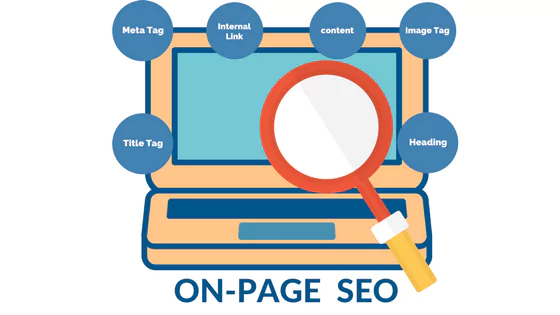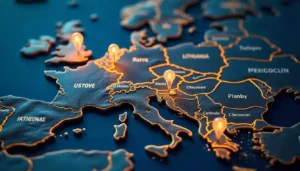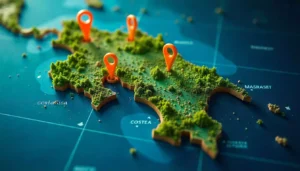On-Page SEO vs. Off-Page SEO: What Matters More for Your Website?
Imagine you’ve just built a brand-new website. It looks great, loads quickly, and has amazing content. But there’s one problem-no one can find it on Google. This is where SEO (Search Engine Optimization) comes in.
Jump to
ToggleSEO is the process of improving your website so it ranks higher on search engines like Google. But SEO isn’t just one thing-it has two main parts: On-Page SEO and Off-Page SEO. Think of On-Page SEO as everything you can control on your website, like content and keywords, while Off-Page SEO focuses on factors outside your site, such as backlinks and social media mentions.
The big question is: Which one is more important? Should you spend more time optimizing your website’s content, or should you focus on getting other websites to talk about you? Let’s break it down so you can make the best decision for your site.
On-Page SEO

On-Page SEO refers to all the things you can do within your website to improve its search rankings. It’s like making sure your house is clean and inviting before guests arrive.
Why is On-Page SEO Important?
Search engines like Google want to show users the best results for their queries. If your website is well-structured, easy to read, and filled with useful information, it has a much better chance of ranking higher.
Key Elements of On-Page SEO
Title Tags and Meta Descriptions
The title of your page is one of the first things Google looks at. A strong title tag should include your main keyword and make people want to click.
Example: Instead of “SEO Tips,” a better title would be “10 Powerful SEO Tips to Boost Your Rankings”.
Similarly, the meta description (the short text below the title in search results) should summarize your content in a way that makes people curious.
Content Quality and Relevance
Your content should be useful, clear, and engaging. Google prioritizes pages that answer user questions well.
Example: If someone searches “how to bake a cake,” your content should provide a complete and easy-to-follow recipe, not just a short paragraph.
Keyword Placement and Density
Using the right keywords helps Google understand your page. But stuffing too many keywords can hurt your rankings. A natural balance is key.
Example: Instead of writing “Best laptop under 50000, this best laptop under 50000 is great for gaming, buy this best laptop under 50000 now,” write “Looking for the best laptop under 50000?
Here are some great options that offer excellent performance and value.”
URL Structure and Internal Linking
A clean and short URL is easier for users and search engines to read.
✅ Good URL: yourwebsite.com/on-page-seo-tips
❌ Bad URL: yourwebsite.com/p=12345&ref=seo-tips?xyz
Also, linking to other pages on your website (internal linking) helps search engines understand your site better.
Image Optimization and Alt Text
Search engines can’t “see” images, so you need to use alt text to describe them. This also helps visually impaired users.
Example: Instead of alt="image123.jpg", use alt="Woman using a laptop for online shopping".
Mobile-Friendliness and Page Speed
Google ranks mobile-friendly websites higher. If your site is slow or hard to navigate on a phone, visitors will leave, and your rankings will drop.
✅ Test your site’s speed with Google’s PageSpeed Insights.
✅ Use a responsive design so your site looks good on all devices.
Off-Page SEO

While On-Page SEO focuses on what happens inside your website, Off-Page SEO is all about building trust and authority from the outside. Think of it like your website’s reputation. If many people talk about and recommend your site, search engines see it as valuable.
Why is Off-Page SEO Important?
Even if your content is amazing, search engines need external signals to confirm that your website is reliable. If well-known websites link to you or people share your content, Google sees it as a vote of confidence.
Key Elements of Off-Page SEO
Backlink Building and Domain Authority
Backlinks are links from other websites to yours. Google considers high-quality backlinks one of the strongest ranking factors.
✅ If a famous tech blog links to your review of a smartphone, Google assumes your content is valuable.
❌ If you get links from spammy or irrelevant sites, it could hurt your rankings.
Social Signals and Brand Mentions
While social media links don’t directly impact rankings, more shares and mentions help increase visibility. If people are talking about your brand on Twitter, Facebook, or LinkedIn, it signals credibility.
Guest Blogging and Outreach
Writing articles for other websites can help you get backlinks and reach new audiences. The key is to contribute to reputable sites that are relevant to your niche.
Local SEO and Business Listings
If you run a local business, Off-Page SEO includes getting listed on Google My Business, Yelp, and other directories. Positive reviews also help improve local rankings.
On-Page vs. Off-Page SEO: The Key Differences

Now that we’ve covered the fundamentals of both On-Page and Off-Page SEO, let’s compare them side by side. While both are essential, they serve different purposes.
| Factor | On-Page SEO | Off-Page SEO |
|---|---|---|
| Definition | Optimization within your website | External factors that impact rankings |
| Main Focus | Content, keywords, structure, and user experience | Backlinks, brand mentions, and external authority |
| Control | Fully in your hands | Relies on other websites and online reputation |
| Impact on SEO | Helps search engines understand and rank your site | Builds trust and authority, boosting rankings over time |
| Examples | Title tags, meta descriptions, content quality, internal linking | Link-building, guest blogging, social signals, brand mentions |
A website needs both On-Page and Off-Page SEO to rank well. Without strong On-Page SEO, even the best backlinks won’t help much. Similarly, a well-optimized site with no external credibility may struggle to gain visibility.
When to Prioritize On-Page SEO
Focusing on On-Page SEO first is a smart strategy, especially if:
- You have a new website – A site with great content and technical optimization lays the groundwork for success.
- Your rankings are low despite having backlinks – Poorly optimized pages won’t rank well, even with good Off-Page SEO.
- Your website has technical issues – Slow loading speed, poor mobile design, or broken links can hurt rankings.
Actionable Steps to Improve On-Page SEO
✅ Conduct keyword research and use terms naturally in your content.
✅ Optimize title tags, headings, and meta descriptions.
✅ Improve site speed by compressing images and enabling caching.
✅ Write high-quality, informative content that solves user queries.
✅ Ensure your website is mobile-friendly and easy to navigate.
When to Focus More on Off-Page SEO
Once your On-Page SEO is in place, Off-Page strategies can help take your rankings to the next level. You should prioritize Off-Page SEO if:
- Your website has strong content but isn’t getting traffic – You need external signals like backlinks and social mentions.
- You’re in a competitive industry – If competitors have more authority, you need Off-Page strategies to stand out.
- Your domain authority is low – Google values trust, and backlinks from reputable sites help build it.
Actionable Steps to Boost Off-Page SEO
✅ Build high-quality backlinks from relevant, authoritative websites.
✅ Write guest posts on trusted blogs in your industry.
✅ List your business on Google My Business and local directories.
✅ Encourage social media shares and brand mentions.
✅ Avoid spammy link-building tactics that could lead to penalties.
Finding the Right Balance for Your SEO Strategy
A successful SEO strategy blends On-Page and Off-Page efforts. Instead of choosing one over the other, consider these key points:
- Start with On-Page SEO – Make sure your site is structured well, has great content, and loads quickly.
- Gradually build Off-Page SEO – Earn backlinks naturally by creating valuable content that others want to share.
- Monitor results and adjust – Use tools like Google Search Console and Ahrefs to track rankings and make improvements.
A good rule of thumb is to spend 60-70% of your effort on On-Page SEO initially and gradually shift focus to Off-Page SEO as your website grows.
Case Study: How On-Page & Off-Page SEO Work Together
Let’s say you run an eCommerce store selling organic skincare products.

- You optimize your product pages with high-quality descriptions, fast-loading images, and clear CTAs (On-Page SEO).
- You write a blog on “Best Skincare Routine for Acne-Prone Skin”, internally linking to your products.
- You reach out to beauty bloggers and influencers, getting backlinks and social mentions (Off-Page SEO).
The result? Your blog ranks higher, your site gains authority, and traffic increases from both search engines and referrals.
| Factor | On-Page SEO | Off-Page SEO |
|---|---|---|
| Definition | Optimizations made directly on the website to improve rankings. | Activities performed outside the website to boost authority and rankings. |
| Main Focus | Content, keywords, meta tags, page speed, internal linking, and user experience. | Backlinks, brand mentions, social signals, influencer outreach, and PR. |
| Control Level | 100% under your control. You can optimize it anytime. | Depends on external factors like backlinks and brand reputation. |
| Speed of Results | Faster-changes reflect in search rankings relatively quickly. | Slower-requires time to build authority through backlinks and mentions. |
| Impact on Rankings | Essential for ranking-Google prioritizes high-quality, well-optimized content. | Crucial for staying competitive-helps rank in high-competition niches. |
| Best For | New websites, quick improvements, user experience enhancement. | Established websites, brand authority building, long-term SEO success. |
| Example Strategy | Optimizing product pages with keywords, improving site speed, writing high-quality blogs. | Getting backlinks from authoritative websites, guest blogging, influencer collaborations. |
| Competitive Edge | Gives an immediate ranking boost but has limitations without strong off-page signals. | Helps outrank competitors in competitive industries like finance, health, and eCommerce. |
| Long-Term Value | Necessary for search visibility but alone isn’t enough in highly competitive niches. | Critical for domain authority-without backlinks, a site may struggle to rank against competitors. |
| Which One Is More Important? | Essential for foundation and quick wins. | Essential for sustained growth and ranking in competitive markets. |
Final Verdict: A Balanced Approach Wins
Instead of debating On-Page vs. Off-Page SEO, the best strategy is to use both.
🔹 On-Page SEO ensures your content is relevant, optimized, and user-friendly.
🔹 Off-Page SEO builds authority, trust, and backlinks that improve rankings.
If you’re just starting, focus on On-Page SEO first, but as you grow, Off-Page SEO becomes essential for long-term success.
By combining high-quality content, technical optimizations, and strategic backlink building, you’ll create a website that ranks higher, drives more traffic, and converts better.







